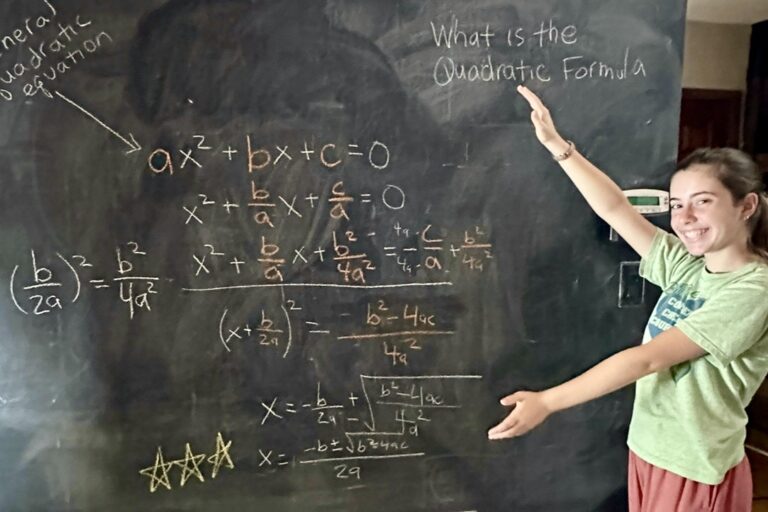An ongoing question in child psychology is, what can help kids do better in school? For a long time, researchers have focused on happiness. The thinking goes, when kids feel happier, they tend to get better grades. But now a new study suggests that parents and schools should focus on another aspect of mental health.
Listen to the NPR audio or read the transcript below.
Below is a text transcript of the audio piece, if you prefer to read it
MICHEL MARTIN, HOST:
One ongoing question in child psychology is what can help kids do better in school? For a long time, researchers have focused on happiness. The thinking goes, when kids feel happier, they tend to get better grades. But now a new study suggests that parents and schools should focus on another aspect of mental health. NPR’s Michaeleen Doucleff has this report.
MICHAELEEN DOUCLEFF, BYLINE: Two years ago, Tania Clarke and her colleagues sent out a survey to teenagers asking about their well-being. She’s a psychologist at the University of Cambridge.
TANIA CLARKE: Our study was conducted with just over 600 adolescents aged 14 to 15 across seven schools in England.
DOUCLEFF: She asked them questions about how confident they feel, and do they have a sense of purpose? The goal was to see what aspects of mental health are associated with doing well in math and English. One stuck out above the others.
CLARKE: Eudaimonia.
DOUCLEFF: Eudaimonia – what does that mean?
CLARKE: It’s about having the opportunity to understand what purpose in life feels like for you and having opportunities to cultivate your unique personal strengths and talents.
DOUCLEFF: So feeling like you’re competent, functioning well, and what you do matters to others. Clarke and her colleagues found that the kids who perform really well in math also had higher levels of eudaimonia, about 50% higher.
CLARKE: They have a higher sense of purpose, meaning, fulfillment and competence.
DOUCLEFF: The study, which was published in School Psychology Review, does have major limitations. It’s relatively small, and it only shows a link to academic performance, not that it actually helps to improve grades. But the study supports a whole slew of other studies looking at how sense of purpose and competence can motivate kids.
DAVID YEAGER: I find the same thing in, like, huge studies.
DOUCLEFF: That’s David Yeager. He’s a psychologist at the University of Texas at Austin. He says despite all this evidence, many school systems haven’t incorporated it into the classroom.
YEAGER: This study is the latest version of an important narrative that has been bubbling up in the scientific literature, but has been mostly ignored in the people who plan our education systems and our narratives about education.
DOUCLEFF: He and Tania Clarke say it’s time for that to change. Clarke says it’s time for schools to start cultivating eudaimonia in teenagers.
CLARKE: To actually help adolescents make connections between the learning and the wider world, what does this mean for them, their interests, their personal goals.
DOUCLEFF: And to help them make connections between what they’re learning and what they want to do with their lives.
Michaeleen Doucleff, NPR News.
If you are interested in Tania Clarke’s paper, you can find it here: https://doi.org/10.1080/2372966X.2023.2217980
A few notes from the study
“Schools are supposed to nurture adolescent wellbeing. However, research suggests school “performativity” cultures rewarding performance in high-stakes examinations are detrimental to adolescents’ wellbeing
This study found adolescents’ overall wellbeing at school was positively associated with their academic attainment in English and Mathematics. Further analyses demonstrated eudaimonia (feeling competent, successful and good about themselves) was the most important wellbeing experience for adolescents’ academic attainment.
At the practice-level, findings suggest schools should pay attention to adolescents’ eudaimonia, creating space for adolescents to actively cultivate their personhoods. For example, supporting adolescents to identify their unique talents, set personal goals and contemplate their lives temporary. Overall, our findings suggest teachers can support positive adolescent development by helping pupils make meaningful connections between their personal strengths and academic work, tailored to their life goals and interests.
Adolescents’ eudaimonia at school (the extent to which they felt successful, confident, and good about themselves) was significantly associated with academic attainment, whereas adolescents’ life satisfaction (feeling things were fun, feeling energetic, unbored, and energised) was not significantly related to their academic attainment.”
Jamie York Academy and the Making Math Meaningful™ curriculum
Jamie York has been nurturing meaningful connections in math teaching for several decades, resulting in the Making Math Meaningful™ curriculum. We believe that competency is achieved through real problem-solving, enthusiastic teaching, and collaborative engagement among students.
Our focus has always been on meaningful connections in math, both within the subject and to the greater world. We also try to help each student develop their confidence in mathematical thinking and problem-solving, and overall competency. Further, we believe that an enthusiasm for learning is essential to that feeling of competency and overall well-being in academics.
Jamie York Academy offers Jamie York’s consciously crafted math courses based on his Making Math Meaningful™ curriculum. We also provide thoughtful, in-depth science and select humanities courses.
We develop your student’s ability to think creatively and critically. We foster enthusiasm for learning by creating opportunities for human interaction.














